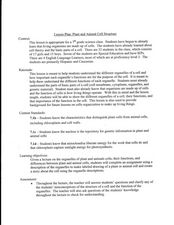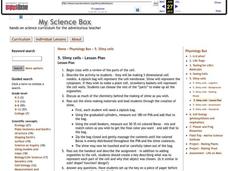Curated OER
Notes on Cell Organelles
Middle schoolers record information and write journal entries on the structure and function of cell organelles while viewing a Powerpoint presentation.
Curated OER
Cell Community
Seventh graders use technology to review cell structure and function. In this cells less, 7th graders review the parts and functions of a cell, and use photography/video and PowerPoint to enhance their explorations.
Curated OER
Plant and Animal Cell Structure
Seventh graders identify the different parts and functions of the cell. In this biology lesson, 7th graders make a labelled diagram of either a plant or animal cell. They write a story about it.
Curated OER
Discovering the Structure of the Atom
Students investigate atomic and nuclear structure of matter by researching historical atomic theories. Students examine Rutherford's studies and discover that many scientific conclusions change over time as new data is collected.
Curated OER
Cell Works
Students identify the different parts of the cells and their functions. In this biology instructional activity, students create an analogy of a cell and its organelles. They make a poster and present it to class.
Curated OER
Slimy cells
Learners study the parts of a cell. In this chemistry lesson students complete an activity in which they make as much slime as they want.
Virginia Department of Education
DNA Extraction from Strawberries
Has your class ever been astounded by the complexity of DNA analysis? Have they ever asked why genetic engineering has become so important to our daily lives? Young scientists perform DNA extraction on strawberries and explore how the...
Curated OER
Plant And Animal Cells
Young scholars identify parts of plant and animal cells and describe the functions of each part. They distinguish between plant and animal cells. After a lecture/demo, students perform experiments which help them construct models of...
Virginia Department of Education
The Ratio of Surface Area to Volume
Demonstrate the ratio of surface area to volume in your high school class by using phenolphthalein, gelatin, and an onion. Intrigue the class by leading a discussion on osmosis and diffusion, then making "scientific jello." Participants...
Curated OER
Biology: Make a Model Cell
Students compare and contrast plant and animal cells and then create a model of the latter. They visit Websites to view the cells and answer questions about them. In pairs, students create cell models using plastic baggies, syrup,...
Curated OER
Staying Young with Vitamin E
Investigate how Vitamin E is used to prevent cell aging. Young scientists coat the surface of apples and bananas with oil, Vitamin E, and water. They place each in a petri dish and cover them to observe oxidation over time. They answer 8...
Curated OER
Onion Skins
Students explore the structure of a plant cell. They carefully peel a single layer of onion skin from a slice of onion and stain it with methylene blue to observe the structures inside. They use a Digiscope connected to a computer to...
Curated OER
Cell physiology and chemistry
Young scholars design an experiment to discriminate between chemical diffusion, osmosis, facilitated diffusion and active transport through a membrane. Be specific about predictions and interpretations!
Curated OER
How Genes Work Lesson Plan
Students define the key terms that are the structure and function of DNA. In this genetics lesson plan students complete a lab activity in which they construct a model DNA structure.
Curated OER
Cell-ebrations in Science
Students recognize that all living things are made up of cell and that they cannot easily be seen by the naked eye. Students become familiar with the use of microscopes as a tool for investigation.
Curated OER
Fighting Infection
Students study immune responses and the structures that are related to immune cells functions. In this fighting infection lesson students construct antibody complexes and model the interaction of the immune system when it is...
Curated OER
Chloroplasts
Students study chloroplasts, their structure and evolution. In this photosynthesis lesson students experiment with polarized light and the production of chlorophyll.
Curated OER
Schools and Cells
Fourth graders create analogies in poster format between a cell's organelles and their school. For example, 4th graders coul say a cell's mitochondria is like the cafeteria, both are a source of energy.
Virginia Department of Education
Prokaryotes
Lead your biology class on a cell-sized adventure! Emerging scientists construct models of prokaryotes, then design an experiment to properly grow a bacterial culture. They conclude the activity by viewing the culture under a microscope....
Curated OER
How do things flow in and out of a cell?
High schoolers revise thier partner's essay. They also write the second draft of their essay for homework. Students use the Protein Explorer web site to visualize molecules, ATP, DNA, proteins and lipid bilayer. They are able to see...
Curated OER
The Great Archeological Dig
Learners explore biology by identifying a diagram. In this cell anatomy lesson, students read a story about archeology and conduct a fictitious archeology dig in class in which they search for animal cells. Learners define a list of...
Curated OER
Hearing and Sound
Students construct a model of the ear to learn the parts of the ear. In this ear lesson plan, students build a model and use a poster to determine the structures and functions of each structure in the ear.
Curated OER
Protists - The Protozoans
Five pages provide thorough coverage of three protozoans: euglena, amoebae, and paramecia. For each, junior biologists read factual text, label the organism, and write answers to several questions. This neatly organized assignment is...
Curated OER
DNA Extraction
Students are able to extract and observe a visible amount of DNA from Escherichia coli cells. They discuss the properties of DNA. Students confirm the presence of DNA by a reaction with an indicator.























